The chicken or the egg?
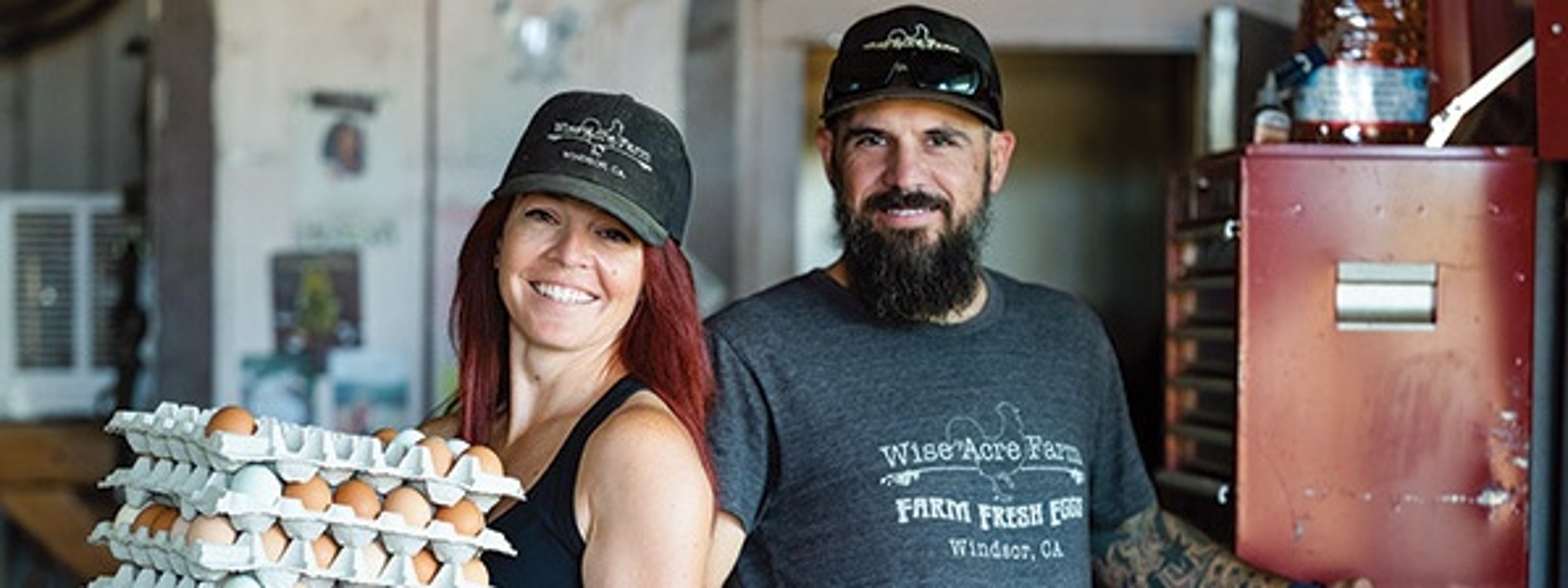
September/October 2022 California Bountiful magazine
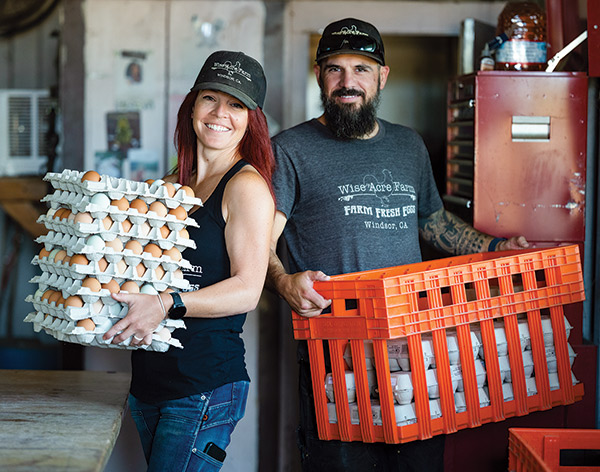
Both come first for
these new farmers
Story by Ching Lee
Photos by Paige Green
Years before she started selling farm-fresh eggs through a vending machine, Sonoma County farmer Tiffany Holbrook says she and her husband, Jason, “had the homesteading dream.”
They already raised backyard chickens and grew a robust vegetable garden every summer. They envisioned “an off-grid lifestyle” when their son, Noah, graduates from high school. That she now runs an egg farm full time is “not too far of a reach from what we talked about,” the first-generation farmer says.
Before the couple bought Wise Acre Farm in 2018, Holbrook had been following it on social media for years, impressed by its pasture-raised chickens, mobile chicken coop and egg vending machine. When she saw the farm for sale on Facebook, “something clicked,” she says, and “there was no turning back once that happened.”
“I was like, that’s it, we’re buying this farm,” Holbrook says. “I felt like this community cannot lose this. This is just so important.”
It wasn’t so much that she wanted to save a chicken farm, she says; she just appreciated the farm’s pasture-based philosophy and educational outreach, aspects she has continued and expanded.
“That is such a rare thing anywhere,” she says. “We’ve become so detached from where our food comes from.”
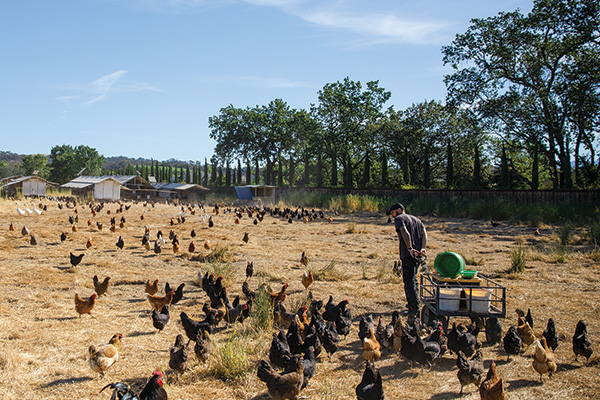
Hatching a new plan
The prospect of buying a farm was “definitely not a plan,” says Jason Holbrook, who also works full time as a shipping and receiving manager at Chalk Hill Estate Winery in Healdsburg. But he says he knew his wife was feeling unfulfilled in her job as a school secretary and wanted a change. When she decided the farm was what she wanted, he says, “I was fully on board with it.”
“I wanted her to be happy,” he says. “As soon as she gets something in her head that she really wants, I know that it’s going to happen, because she never gives up on anything. So now we are full-time chicken farmers.”
He describes the change as positive, noting how they both “lost a lot of weight” and are “much more fit” working on the farm.
Tiffany Holbrook’s love of animals traces back to childhood. Whereas other children might have adopted imaginary friends, she says, she conjured an imaginary puppy and kitty. She started raising backyard chickens at age 14 because “I knew that was an animal my parents would let me get.”
“I’ve been chicken-obsessed for quite a while,” she says. “I wanted chickens before they were this popular animal that people like to own.”
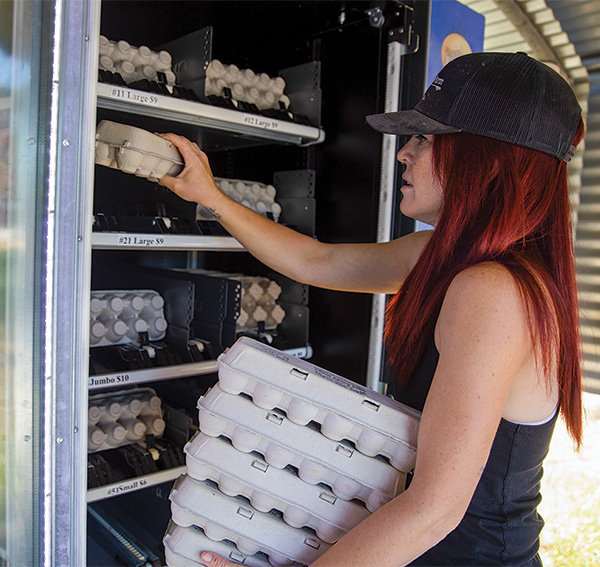
Vending machine? Yes! Bakeries, too
Once the Holbrooks bought a house in 2015 and were no longer renters, they got backyard chickens—at first four or five birds, then 12.
Today, their farm’s main flock consists of 1,000 to 1,500 egg layers of several different breeds, which allow the farm to produce eggs with a variety of colors—from shells of white to light and dark brown to blue-green.
The eggs are sold via the on-farm vending machine, which dispenses them by the carton and is open 24/7. The farm also sells eggs through honor-system refrigerators at farm stands throughout the region.
In addition, several local restaurants and food-service operators buy eggs directly from Wise Acre Farm. Among them is Windsor-based BurtoNZ Bakery, located about a mile from the farm. The bakery, owned by Warren and Bobbi Burton, specializes in New Zealand-style baked goods and uses Wise Acre eggs exclusively.
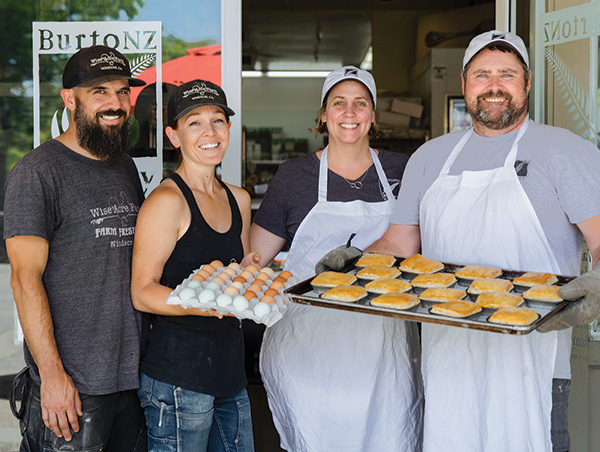
In a typical week, the bakery goes through 80 to 90 dozen of the farm’s eggs. They’re used in savory items such as the bakery’s well-known bacon-and-egg pies and sweets, including donuts, cinnamon buns and desserts such as lemon slice and custard squares.
The Burtons say they prefer farm-fresh eggs from Wise Acre because the yolks are richer and brighter orange. Using different eggs, they say, would change the color and quality of their products, especially those in which egg is the main ingredient.
What’s more, the Burtons say they value local businesses and want to support them. Bobbi Burton says she loves seeing “the girls” from the road as she drives by the farm.
“It feels really, really good to be a small business partnering with another small business that you can literally drive past on your way to work and see where your food is coming from,” she says. “When you say farm to table, it really is. It’s farmer to our tables here in the shop.”
Warren Burton says they’ve become good friends with the Holbrooks, whom they would see shopping at the local farmers market every week. He would give them a loaf of bread, or sometimes he would drop off Tiffany’s favorite raspberry and white chocolate scone at the farm.
“It’s just a great relationship, and that’s what it’s all about,” he says.
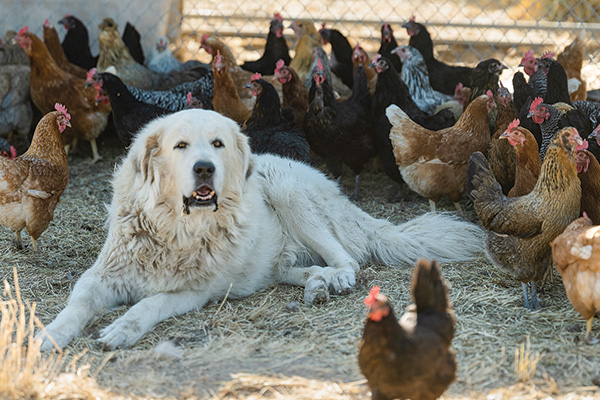
Visitors welcome at Wise Acre Farm
Meanwhile, Wise Acre continues to expand its offerings. The farm has always welcomed school tours and visitors. To protect its main flock from infectious diseases, the production area is not open to the public, but the birds are often visible from the farm’s driveway as they’re rotated around the 15-acre pasture.
Wise Acre also keeps a small flock of specialty chickens, plus roosters, ducks, geese and goats to greet visitors. To draw business to the egg vending machine, the farm has a goat-treat dispenser nearby, so visitors can feed the animals when they stop in to shop.
“It’s just something fun that people can come and do and see when they visit,” Tiffany Holbrook says.
“I want a mom to be able to take her toddler out and go do something for free that’s not at a park, a playground or whatever, just something different.”
This fall, Wise Acre Farm will add turkeys to its flock. It will be selling the Thanksgiving birds through its website. Next year, the farm plans to sell grass-fed beef as part of a partnership with a local landowner who’s using the cattle as wildlife restoration on his property.
Seasonal slowdown
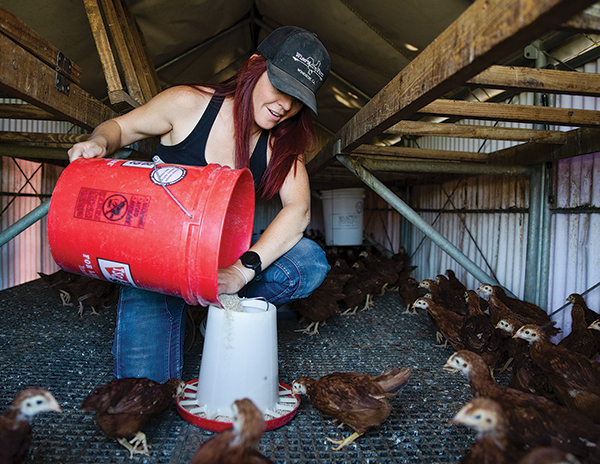
As with crops, there’s a seasonality to raising chickens. This time of year, as temperatures drop and daylight becomes shorter, chickens lose their feathers and grow new ones, a process known as molting. Because it takes much energy and calories to make new feathers, egg production slows or completely stops, says egg farmer Tiffany Holbrook.
“It looks like a chicken massacre starting in October because there’s just feathers everywhere out in the pasture,” she says. “I think it’s so amazing because it works in harmony with nature.”
Having 1,500 layers helps, because it allows Holbrook to keep some eggs coming during the slower months from October to February, when production begins to ramp back up. Operating according to the chicken’s natural cycle “mainly gives us a break,” she says, because there are fewer eggs to collect and process during the winter. Her workday ends at 6 p.m. instead of 9 p.m.
“It allows us to recharge and reset before we go into the six to seven months of really busy time,” she says.

